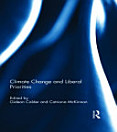The Ethics of “Geoengineering” the Global Climate: Justice, Legitimacy and Governance
About this ebook
Nevertheless, it is widely recognized that geoengineering raises critical questions about who will control planetary interventions, and what responsibilities they will have. Central to these questions are issues of justice and political legitimacy. For instance, while some claim that climate risks are so severe that geoengineering must be attempted, others insist that the current global order is so unjust that interventions are highly likely to be illegitimate and exacerbate injustice. Such concerns are rarely discussed in the policy arena in any depth, or with academic rigor. Hence, this book gathers contributions from leading voices and rising stars in political philosophy to respond. It is essential reading for anyone puzzled about how geoengineering might promote or thwart the ends of justice in a dramatically changing world.
The chapters in this book were originally published in the journals: Ethics, Policy & the Environment and Critical Review of International Social and Political Philosophy.
About the author
Stephen M. Gardiner is Professor of Philosophy at the University of Washington, Seattle, and is author of A Perfect Moral Storm: the Ethical Challenge of Climate Change and Debating Climate Ethics, as well as many articles on climate justice and the ethics of geoengineering.
Catriona McKinnon is Professor of Political Theory at the University of Exeter, author of Climate Change and Future Justice and numerous articles on climate ethics and justice.
Augustin Fragnière is a trained philosopher and environmental scientist, who has published on climate ethics, geoengineering and sustainability theory.






